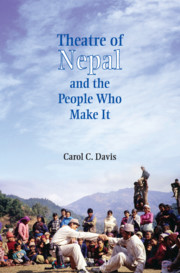Book contents
- Frontmatter
- Dedication
- Contents
- List of Figures
- Acknowledgements
- Prologue
- 1 From Darkness to Light: Antiquity through the Malla Golden Age
- 2 Ruthless Rulers: The Rise of the Shah and the Rana Takeover
- 3 The Drama of Nationalism: Sama Engaged
- 4 Modernism's Advance: Post-Sama Dramatists
- 5 The Pro-Democracy Movement: Ashesh Malla Takes to the Streets
- 6 Cultivating Theatre Aesthetics: Sunil Pokharel's Vision
- 7 Diaspora: Urban Theatre Outside the Capital
- 8 Legacy: Contemporary Theatre in the Kathmandu Valley
- Bibliography
- Index
7 - Diaspora: Urban Theatre Outside the Capital
Published online by Cambridge University Press: 26 April 2019
- Frontmatter
- Dedication
- Contents
- List of Figures
- Acknowledgements
- Prologue
- 1 From Darkness to Light: Antiquity through the Malla Golden Age
- 2 Ruthless Rulers: The Rise of the Shah and the Rana Takeover
- 3 The Drama of Nationalism: Sama Engaged
- 4 Modernism's Advance: Post-Sama Dramatists
- 5 The Pro-Democracy Movement: Ashesh Malla Takes to the Streets
- 6 Cultivating Theatre Aesthetics: Sunil Pokharel's Vision
- 7 Diaspora: Urban Theatre Outside the Capital
- 8 Legacy: Contemporary Theatre in the Kathmandu Valley
- Bibliography
- Index
Summary
We used to go to Kathmandu and come back and share whatever we had learned there.
—Ram Bhajan KamatKathmandu has long been the epicentre of theatre in Nepal, although communities throughout the country have also used theatrical means to express core interests. Nepal's rural areas have enjoyed healthy traditions of folk and religious drama. In the urban centres of these rural areas theatre activity has gone through more phases of change than in their rural surrounds and, with a few exceptions, these changes have generally followed a pattern. Usually theatre activity in far-flung urban centres originates with the production of religious and folk performances and events; it proceeds to an interest in modern drama similar to that shown in Kathmandu as a result of emissaries learning from capital theatres; finally, it develops into theatre staged with the aim of changing society. We find this paradigm in diverse places throughout the country, such as in southeastern Dharan, western Surkhet, central Palpa, eastern Ilam, and southern Biratnagar. We also find important exceptions to this pattern, wherein urban theatres have developed somewhat independent of Kathmandu personalities and forms. In centrally located Pokhara, the deviation from the pattern involves the diverse and original work of the brilliant playwright, Sarubhakta. Offering another departure from the paradigm, the city of Janakpur boasts Nepal's longest continuously operating theatre group, which predates its contemporaries in Kathmandu and functions somewhat differently from them. We will take a look at these two exceptions before proceeding to those theatres that adhere more closely to the prevailing paradigm.
Sarubhakta
Drama is our culture. If drama is extinct, our culture will be too
—SarubhaktaBhakta Raj Shrestha (pen name, Sarubhakta, b. 1955) is an important Nepali dramatist who attended the first National Theatre Festival in 1980 (in Kathmandu) and stunned audiences there with the quality and originality of his work. At the time of that festival, Sarubhakta was the primary dramatist, director, and actor of a theatre group from Nepal's second largest city, Pokhara, located 200 kilometres due west of Kathmandu and with a population of 14,624 in 1963 (Gurung, 1965: 23), 95,300 in 1991 (CBS, 2000: 12), and 265,000 in 2011 (CBS, 2015: 21).
- Type
- Chapter
- Information
- Theatre of Nepal and the People Who Make It , pp. 89 - 112Publisher: Cambridge University PressPrint publication year: 2019



